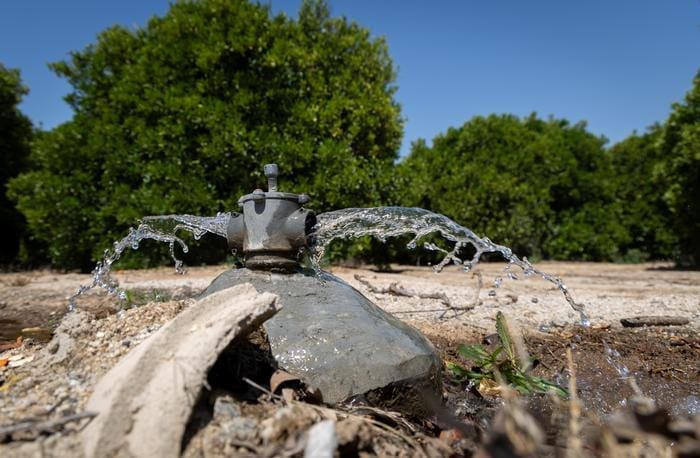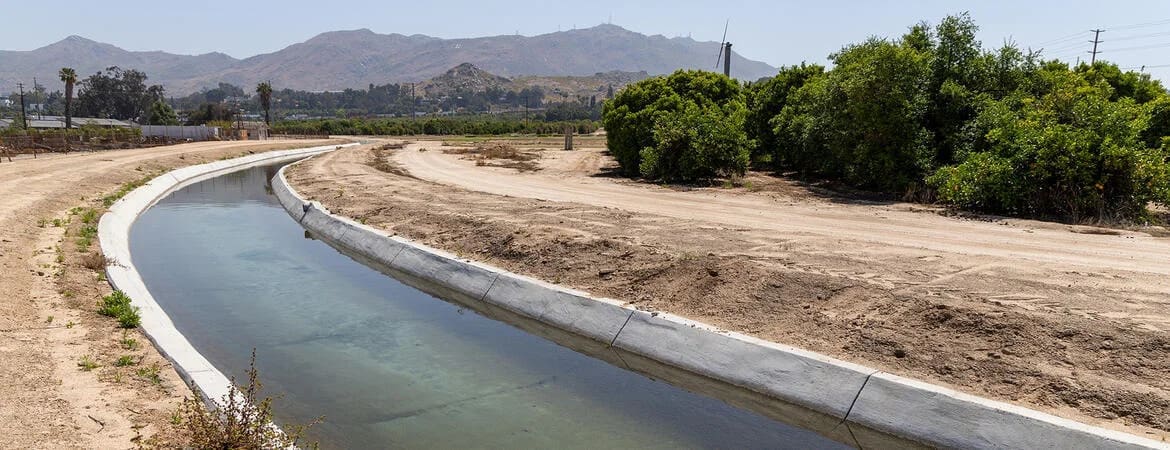By David Danelski | University of California – Riverside
California should take urgent and bold measures to adapt its $59 billion agriculture sector to climate change as the amount of water available for crops declines, according to a collaborative report by University of California faculty from four campuses.
Published in the Proceedings of the National Academy of Sciences (PNAS), the report provides a roadmap for more water capture, storage, and distribution systems that are in harmony with climate projections and ecosystems. It further considers how runoff and groundwater can be used repeatedly as it flows generally from mountainsides to coastal lands.
“The availability of water for consumption is decreasing because of climate change, partly due to increased evaporation and transpiration but also because we don’t have the system set up to capture and use the larger and more variable flows that are now the norm,” said Kurt Schwabe, a public policy professor at UC Riverside and co-author of the report.
A warmer planet means fewer but larger rain and snowstorms in California. The rising temperatures and shorter winters also result in smaller volumes of water stored in mountain snowpacks that have historically replenished California’s reservoirs each spring. And a greater amount of water is getting lost through evaporation.
This means that agriculture, which uses about 80 percent of the water consumed in the state, will need to adjust to a future with less water available for irrigation.

To help reduce the overall impact on agriculture and society from climate change, the report’s authors envision a more nimble and responsive system that can capture and store water from big storms before it goes to sea to prevent floods and keep crops growing through the hot, dry summer months.
To do so, California must increase its water storage capacity, but that doesn’t necessarily require building more dams and reservoirs, Schwabe said. Great storage capacity now exists in the state’s depleted aquifers below the Central Valley and the coastal plains.
“It’s really a huge win,” Schwabe said. “We can start taking more of those flood flows, and unexpected overflows, and put them in these groundwater aquifers. We’ve got plenty of capacity there, and you don’t suffer from the evaporation rates that you do with the surface reservoirs.”
Capturing the flows would involve diverting torrents from heavy rains and accelerated snowmelts to farm fields or to habitat lands where controlled flooding would cause no harm, and the water would percolate down to aquifers. Farmers would then have more groundwater to get through drier periods while also reviving wildlife habitats.
Farmers also should take advantage of new crop varieties, so they have more flexibility to deal with different water situations. Changing crops, unlike changing irrigation systems, is a practice that can lead to reduced overall water use.
“It’s obviously an economic decision confronting the growers,” Schwabe said.
However, switching from a water-intensive practice such as flood irrigation to something like drip irrigation, doesn’t necessarily save much water at the system level, he said. Flood irrigation may be appropriate if it helps recharge aquifers, or the runoff is used again by other farms.
“Sometimes the runoff water appears later in the system for use,” Schwabe said.
California also needs to build more flexibility into its water delivery systems. The state’s three major aqueducts — the California State Water Project, the Central Valley Project, and the Colorado River Aqueduct — for the most part transport water from north to south. A greater ability to move water from east to west and vice versa would allow for more efficient water use. Farmers who have more water than they need for a particular season could sell to others in need. With prices based on scarcity plus delivery costs, such a marketplace would have incentives for storage and efficient use, Schwabe said.
The report’s title is ‘Cultivating Climate Resilience in California Agriculture: Adaptations to an Increasingly Volatile Water Future.’
In addition to Schwabe, the report’s co-authors are Josué Medellín-Azuar at UC Merced, Alvar Escriva-Bou at UCLA, and Amélie Gaudin and Daniel Sumner at UC Davis.
“When I moved to California over 20 years ago, someone told me, ‘Don’t let people tell you there isn’t a lot of water in California because there is. The problem is that it’s just managed really poorly,’” Schwabe said.
That said, Schwabe believes the state is making progress by developing policies that can lead to more efficient and sustainable outcomes, such as the Sustainable Groundwater Management Act of 2014.
“Today more than ever before we’re seeing partnerships across environmental, agricultural, and municipal sectors to address water scarcity issues,” Schwabe said. “And that’s a good thing.”
More information: Josué Medellín-Azuara, Alvar Escriva-Bou, Amélie C. M. Gaudin, Kurt A. Schwabe and Daniel A. Sumner, ‘Cultivating climate resilience in California agriculture: Adaptations to an increasingly volatile water future’, PNAS (121 32; 2024); DOI: 10.1073/pnas.2310079121 | UCR Press Release/Material. Featured image: The Gage Canal at the University of California, Riverside, Agricultural Experiment Station in Riverside, Calif, on May 8, 2024 Credit: Stan Lim | UC Riverside




